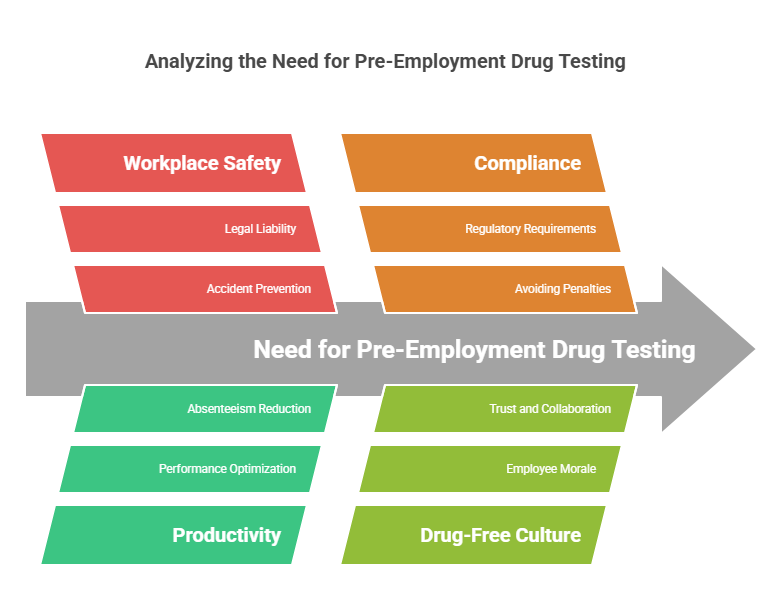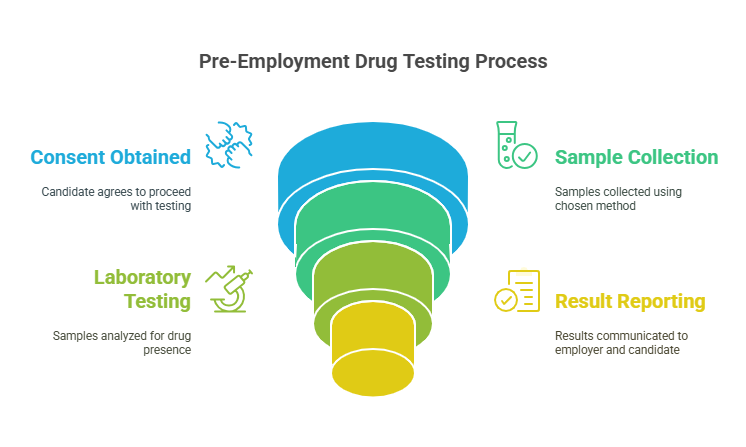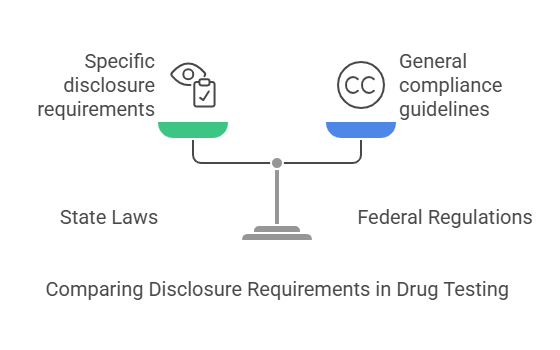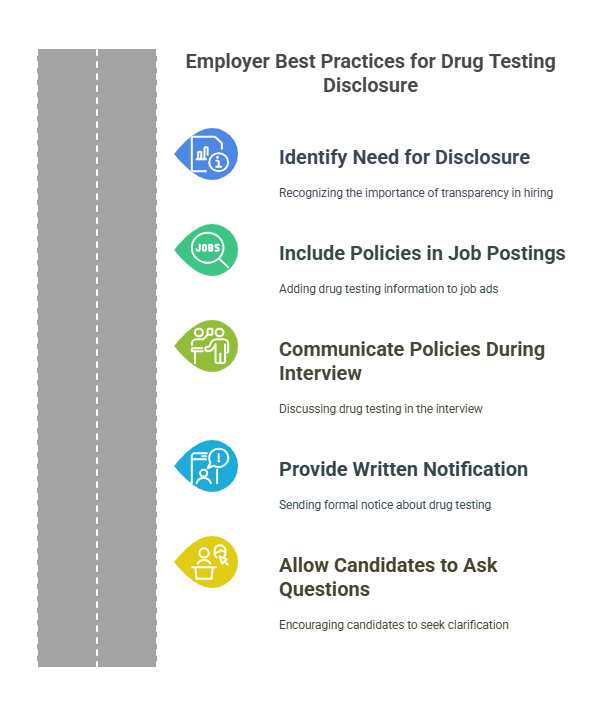How to Understand Pre-Employment Drug Testing Policies

Introduction and Overview of Pre-Employment Drug Testing
What is Pre-Employment Drug Testing?
Pre-employment drug testing is a process in which employers test potential employees for the presence of drugs or alcohol in their system before finalizing the hiring decision. Typically conducted after the interview phase and before the job offer is confirmed, pre-employment drug tests are an essential part of many employers’ recruitment procedures. The goal is to ensure that candidates are not under the influence of illegal or controlled substances, which could impact their ability to perform the job safely, effectively, and responsibly.
While the substances tested for may vary, a standard pre-employment drug test often screens for the following categories:
- Marijuana (THC)
- Cocaine
- Opioids (such as heroin, codeine, or oxycodone)
- Amphetamines (including methamphetamine and MDMA)
- Phencyclidine (PCP)
These five substances are commonly targeted in a 5-panel drug test, the most widely used drug test in the workplace. In some cases, companies may opt for more comprehensive tests that look for additional substances, such as alcohol, synthetic drugs, or prescription medications, depending on the job and industry requirements.
Why Do Employers Use Pre-Employment Drug Testing?

Employers implement pre-employment drug testing for several reasons, ranging from safety concerns to maintaining a productive and compliant workforce. Let’s explore some of the primary motivations behind this practice:
1. Ensuring Workplace Safety
One of the primary reasons employers choose to conduct drug testing is to maintain a safe working environment. In industries where employees operate machinery, drive vehicles, or engage in safety-sensitive tasks, the risk of accidents due to drug or alcohol use is particularly high. For example, in the transportation, construction, and manufacturing sectors, even minor impairments can lead to major safety hazards. A pre-employment drug test ensures that individuals who are hired do not pose a risk to themselves or their colleagues by being under the influence of harmful substances.
In addition to protecting employees’ safety, employers also use drug testing to avoid costly accidents and legal liabilities. If an accident occurs and the employee involved tests positive for drugs, the employer could be held responsible for not taking appropriate precautions, which could lead to significant legal or financial repercussions.
2. Maintaining Productivity
Drug use can have a direct impact on an employee’s productivity. Individuals who use drugs may struggle with focus, concentration, and decision-making, which could ultimately hinder their performance at work. Furthermore, substance abuse is often linked to absenteeism, tardiness, and a lack of motivation—all of which can disrupt workflow and affect overall team productivity.
By implementing pre-employment drug testing, employers can identify individuals who are less likely to perform optimally due to substance use, and thus reduce the potential for future issues. A workforce that is free from drug use is typically more reliable, efficient, and focused on their responsibilities, which translates into better business outcomes.
3. Compliance with Industry Regulations
Certain industries are required to conduct drug testing as part of compliance with federal or state regulations. For example, in transportation, aviation, and healthcare, employees are often subject to mandatory drug tests to ensure that they do not perform duties while impaired. The Department of Transportation (DOT), for example, mandates drug testing for commercial drivers in the transportation industry to comply with Federal Motor Carrier Safety Administration (FMCSA) regulations.
Employers in such regulated industries are legally bound to conduct drug tests as part of their hiring and ongoing employment practices. Failure to adhere to these regulations can result in severe penalties, fines, and potential loss of business licenses or contracts. As a result, pre-employment drug testing is often a necessary part of hiring in these fields.
4. Reducing Liability and Legal Risks
Employers are often legally required to maintain a safe and drug-free workplace. If an employee gets injured or causes harm to others while under the influence of drugs or alcohol, the employer could be held liable for not conducting thorough screening during the hiring process. In some cases, employers may face lawsuits or claims for failing to ensure the safety of their workers or clients.
By incorporating pre-employment drug testing into the hiring process, employers take a proactive approach to managing risk. If a candidate tests positive for drugs, the employer can take appropriate action (such as rescinding the job offer) to prevent potential liability issues. This is particularly important in industries where employee performance directly impacts safety, customer satisfaction, or the company’s reputation.
5. Promoting a Drug-Free Workplace Culture
Beyond ensuring safety and compliance, pre-employment drug testing is also part of broader corporate policies aimed at maintaining a drug-free workplace. Employers who implement drug-free policies promote health, wellness, and a positive working environment. By screening out individuals who may have substance use issues, companies create a work environment that encourages responsible behavior and a focus on high performance.
A drug-free workplace is essential for fostering employee morale and ensuring that everyone is treated equally. Companies that prioritize a drug-free environment are more likely to attract high-quality candidates who value a healthy, productive workplace culture. Additionally, employees may feel more confident knowing that their colleagues are not impaired, which can lead to higher levels of trust and collaboration.
The General Process of Pre-Employment Drug Testing

Although the specifics of the process can vary depending on the employer’s policy, the type of drug test used, and state regulations, pre-employment drug testing generally follows a few key steps:
1. Notification and Consent
Before undergoing a pre-employment drug test, candidates are typically notified by the employer that a drug test will be required. In most cases, this notification occurs after an offer of employment has been extended but before the candidate has formally accepted the position. Notification can be provided in writing, during the interview, or as part of the job offer letter.
It’s important to note that employers are generally required to inform candidates about drug testing policies in advance. This allows the candidate to make an informed decision regarding whether they wish to proceed with the test. Some states or industries have stricter guidelines for notifying candidates about drug tests, so employers must ensure that they comply with all applicable laws.
Once notified, the candidate must give consent before the drug test can take place. In some cases, this consent may be required in writing. If a candidate refuses to take the drug test, it can result in the withdrawal of the job offer, depending on the employer’s policies.
2. Collection of Samples
The next step involves the collection of samples to test for drugs. Employers can choose from various testing methods, including:
- Urine Testing: The most common method, as it’s easy to administer, cost-effective, and can detect a wide range of substances. Urine samples are typically collected in a private bathroom, and the collection process is monitored to ensure no tampering.
- Hair Follicle Testing: This method involves collecting a small sample of hair from the candidate. Hair tests are capable of detecting drug use over a longer period, typically up to 90 days.
- Saliva Testing: Saliva tests are becoming more popular due to their convenience and ability to detect recent drug use. However, they have a shorter detection window compared to urine or hair tests.
- Blood Testing: Blood tests are less common but may be used in specific situations. They are typically used when an employer requires immediate, reliable results, as they can detect current drug use.
The candidate will be directed to a certified collection site or laboratory, where the sample will be collected and prepared for analysis.
3. Testing and Reporting Results
After the sample is collected, it is sent to a certified laboratory for testing. The laboratory analyzes the sample for the presence of specific drugs or metabolites. The results are typically available within a few days, though the exact timing can vary depending on the type of test and the laboratory used.
If the drug test is negative (no drugs are detected), the candidate will move forward in the hiring process. However, if the test is positive, the employer may decide to withdraw the job offer, depending on the company’s policies and the severity of the results.
4. Employer Action Based on Results
If a candidate tests positive for drugs, the employer will typically follow their established protocol, which may include providing the candidate with an opportunity to explain the results, offering a second test (e.g., confirmation test), or rescinding the job offer. If the drug test results are negative, the employer will proceed with extending the job offer and initiating the hiring process.
Do Employers Have to Inform Candidates About Pre-Employment Drug Testing?
In many countries, including the United States, employers are generally required to inform candidates about pre-employment drug testing before it is conducted. However, the specific rules and requirements for disclosure can vary depending on the state, industry, and company policy. Understanding these legal nuances is essential for both employers and job seekers to ensure compliance and transparency throughout the hiring process.
Legal Requirements for Employer Disclosure

In the U.S., while there is no federal law that mandates employers to disclose drug testing policies during the hiring process, several states and industries have established guidelines to ensure that candidates are informed. Here’s a breakdown of how the laws generally work:
1. Federal Regulations
Under federal law, employers in certain industries—such as transportation, aviation, and healthcare—must comply with mandatory drug testing requirements. However, these regulations do not always include specific provisions for disclosure. For example, the Department of Transportation (DOT) requires drug testing for employees in safety-sensitive positions, but the law does not dictate how or when employers must inform candidates. It’s assumed that employers will make the policy clear at some point during the hiring process.
While federal law doesn’t explicitly mandate that employers must inform candidates of drug testing before it occurs, best practices suggest that employers should notify job applicants ahead of time. This helps ensure that candidates can make an informed decision regarding the test and provides clarity regarding the hiring process.
2. State Laws and Regulations
State laws can be more specific and may require employers to disclose their drug testing policies before administering a pre-employment drug test. For example:
- California: In California, employers must inform candidates about the drug testing requirements in writing before the test is conducted. If the employer fails to notify the applicant, the results of the test may be deemed invalid.
- Florida: Florida law mandates that employers notify candidates of pre-employment drug testing policies. However, the state allows for more flexibility in terms of when the notification is given. As long as candidates are aware before being asked to take the test, the notification is considered legally compliant.
- Texas: Texas follows a similar approach, where employers are required to provide candidates with notice of their drug testing policy. Employers can typically include this notice as part of the employment application or job offer letter.
In some states, drug testing is only permitted with the applicant’s written consent. Employers in these states may be required to notify candidates well in advance, including providing information about what substances will be tested for, how the test will be conducted, and whether the results will be shared with third parties.
3. Industry-Specific Guidelines
Certain industries have specific rules about when and how employers must inform candidates of drug testing policies. For instance:
- Transportation and Aviation: As per the Federal Motor Carrier Safety Administration (FMCSA) and the Federal Aviation Administration (FAA), employers in these sectors must inform applicants of drug testing requirements before the test occurs. This includes post-offer drug testing for positions involving driving commercial vehicles or operating aircraft.
- Healthcare: Healthcare organizations often have drug-free workplace policies to ensure that their employees are not under the influence while providing care. For healthcare positions, pre-employment drug testing is common, and healthcare employers are typically required to inform candidates about the testing process.
Employers in regulated industries are subject to strict rules and must follow clear notification procedures to ensure compliance with both state and federal guidelines. Failure to do so can result in legal challenges and invalidated test results.
Employer Best Practices for Disclosure of Pre-Employment Drug Testing

While it may not always be a legal requirement in every jurisdiction, informing candidates about pre-employment drug testing is considered best practice for most employers. Proper communication fosters transparency, builds trust with candidates, and ensures that the hiring process is fair and compliant with relevant laws. Here are some key best practices for employers regarding drug testing disclosure:
1. Include Drug Testing Policies in Job Postings or Application Forms
One of the most effective ways to notify candidates about drug testing requirements is to mention it upfront in job advertisements or application forms. This allows candidates to understand the expectations before even applying for the role. For example, employers can include a statement such as:
“All candidates are required to undergo a pre-employment drug screening before receiving a formal job offer.”
This helps set clear expectations and reduces the likelihood of misunderstandings later on. Candidates who are uncomfortable with drug testing will be aware of the requirement before investing time in the application process.
2. Communicate Drug Testing Policies During the Interview
During the interview process, employers should clearly communicate their drug testing policies to potential candidates. This is a good opportunity to reinforce that drug testing will be part of the hiring process. Providing this information verbally ensures that the candidate understands the requirement before moving forward.
Employers can include this information as part of the discussion around job conditions, workplace policies, and benefits. For example, interviewers can say:
“As part of our pre-employment process, all selected candidates are required to complete a drug screening.”
3. Provide Written Notification Before Drug Testing
In states where written consent is required or best practice dictates, employers should provide candidates with formal written notification about the drug testing requirement. This notice can be included in the offer letter or a separate document that clearly outlines the testing procedures, substances being tested, and what to expect.
Written notification allows candidates to fully understand the scope of the testing and gives them a chance to ask any questions about the process before agreeing to it. It also provides a record of disclosure, which can help protect employers in the event of legal disputes.
4. Allow Candidates to Ask Questions
Employers should create an environment where candidates feel comfortable asking questions about the drug testing process. Some applicants may be unfamiliar with the testing procedures or have concerns about the substances being tested for. By being open and transparent, employers can address any concerns and clarify expectations.
Providing clear answers to questions about the test’s scope, the testing method, and the consequences of a positive result can help candidates make informed decisions and create a positive impression of the company’s hiring process.
Exact Background Checks and Our Drug Testing Services
As part of our commitment to helping employers maintain a safe and compliant workforce, Exact Background Checks offers comprehensive drug testing and background screening services. We understand that drug testing can be a sensitive and complex process, so we work closely with employers to ensure they meet all legal requirements and industry best practices.
We offer a range of drug testing solutions, including urine, hair, saliva, and blood tests, to meet the specific needs of each employer. Our testing services are fully compliant with state and federal regulations, ensuring that employers remain within the bounds of the law while conducting drug screenings.
Additionally, our platform makes it easy for employers to implement pre-employment drug testing as part of their recruitment process. With clear guidelines and automated processes, we take the hassle out of drug testing, providing fast and reliable results that employers can trust.
Legal Aspects of Pre-Employment Drug Testing
Pre-employment drug testing is subject to various legal regulations that aim to protect both employers and employees. While employers have the right to enforce drug-free workplace policies, they must do so within the boundaries of state and federal laws. These legal aspects vary by jurisdiction, and understanding the regulatory landscape is crucial for both employers and candidates.
1. Workers’ Rights and Protections
In most states, pre-employment drug testing is legal as long as the employer provides appropriate notice and obtains consent. However, employees are entitled to certain protections under employment laws. Here are some important considerations regarding workers’ rights:
- Right to Privacy: Some states have strong privacy protections for employees, which may restrict the extent to which employers can conduct drug testing. For example, California’s Right to Privacy law provides employees with certain rights concerning drug testing and restricts employers from testing employees without a valid reason, such as safety concerns or suspicion of drug use during work hours.
- Non-Discriminatory Practices: Employers must ensure that their drug testing policies are applied uniformly to all candidates and employees. Discriminatory practices, such as testing only certain individuals based on race, gender, or disability, can lead to lawsuits and legal challenges. All candidates should be treated equally, and drug testing should be a standardized part of the hiring process for all applicants.
- Medical Marijuana Use: In states where medical marijuana is legal, employers may still have the right to enforce drug-free workplace policies. However, they may be required to accommodate medical marijuana users under specific circumstances, especially if the drug use does not affect the employee’s ability to perform their job. Employers must carefully navigate the balance between respecting workers’ rights and maintaining a safe and productive work environment.
- Accommodations for Disabilities: Under the Americans with Disabilities Act (ADA), employees who have a disability and use prescription medication may need accommodations. However, the ADA does not protect employees from drug testing if they are using drugs that impair their ability to perform their job duties or affect workplace safety.
2. State Regulations and Employer Requirements
The specific rules regarding pre-employment drug testing vary from state to state. Some states have strict regulations in place, while others offer more flexibility for employers. Let’s explore some key legal frameworks that employers must consider when implementing drug testing:
- Pre-Employment Disclosure Laws: In some states, employers are required to disclose their drug testing policies in writing before administering a test. This notice can often be provided through the job application process, the offer letter, or a dedicated notice. States like California, Florida, and Texas have such laws in place to ensure transparency and fairness.
- Mandatory vs. Voluntary Testing: While some industries mandate drug testing, such as transportation and healthcare, other employers may implement voluntary drug testing. These voluntary tests may be done to enhance workplace safety or reduce liability but are not legally required. Employers should make sure they comply with any applicable state regulations that govern voluntary testing programs.
- Drug Testing After an Accident: Many employers, particularly in safety-sensitive industries, require post-accident drug testing. In some states, laws mandate drug testing if an employee is involved in a workplace accident or injury, especially if the accident could be attributed to impaired behavior. Employers must ensure that these tests are administered promptly and in compliance with applicable legal requirements.
- Testing for Legal Substances: In certain states, employers may be required to test for specific substances that are legally regulated, such as prescription drugs or medical marijuana. Employers should have clear guidelines on what substances they are testing for, and ensure compliance with state laws regarding the testing and handling of legally prescribed drugs.
3. Compliance with Federal Regulations
While federal law does not require all employers to conduct pre-employment drug testing, certain industries must comply with federal drug testing regulations. Here are some examples of federally regulated industries:
- Transportation: The Department of Transportation (DOT) mandates that employers in the transportation industry conduct drug and alcohol testing for safety-sensitive positions. This includes testing for drivers, pilots, and rail workers. DOT regulations specify the substances to be tested and the testing procedures to ensure safety in these industries.
- Aviation: The Federal Aviation Administration (FAA) requires drug testing for employees working in safety-sensitive positions within the aviation industry, including pilots, air traffic controllers, and other personnel involved in flight operations.
- Federal Contractors: Employers that are federal contractors may be required to conduct drug testing on their employees, especially for employees working on federal projects or those handling government contracts. Employers must adhere to specific protocols for testing, reporting, and maintaining drug-free workplace standards.
Employers in regulated industries must stay up-to-date on the latest requirements and ensure compliance with both federal and state laws. Failing to follow these regulations can result in fines, penalties, or loss of contracts.
Frequently Asked Questions (FAQs) About Pre-Employment Drug Testing
To help clear up common questions regarding pre-employment drug testing, here are five frequently asked questions along with detailed answers:
What is pre-employment drug testing, and what substances are commonly tested for?
Pre-employment drug testing is the process of screening potential employees for drug or alcohol use before hiring. Common substances tested include marijuana (THC), cocaine, opioids, amphetamines, and PCP.
Why do employers use pre-employment drug testing?
Employers use it to ensure workplace safety, maintain productivity, comply with industry regulations, reduce liability, and promote a drug-free workplace culture.
What is the general process of pre-employment drug testing?
The process includes notification and consent, sample collection (urine, hair, saliva, or blood), testing and reporting results, and employer action based on the results.
Do employers have to inform candidates about pre-employment drug testing?
While federal law doesn't always mandate disclosure, many state and industry-specific laws require it. Employers should follow best practices by including policies in job postings, communicating during interviews, and providing written notification.
What are the key legal aspects of pre-employment drug testing?
Key legal aspects include workers' rights and protections (privacy, non-discrimination, medical marijuana use, ADA accommodations), state regulations (disclosure laws, mandatory vs. voluntary testing, post-accident testing), and compliance with federal regulations (DOT, FAA, federal contractors).
What is pre-employment drug testing, and what substances are commonly tested for?
Pre-employment drug testing is the process of screening potential employees for drug or alcohol use before hiring. Common substances tested include marijuana (THC), cocaine, opioids, amphetamines, and PCP.
Why do employers use pre-employment drug testing?
Employers use it to ensure workplace safety, maintain productivity, comply with industry regulations, reduce liability, and promote a drug-free workplace culture.
What is the general process of pre-employment drug testing?
The process includes notification and consent, sample collection (urine, hair, saliva, or blood), testing and reporting results, and employer action based on the results.
Do employers have to inform candidates about pre-employment drug testing?
While federal law doesn't always mandate disclosure, many state and industry-specific laws require it. Employers should follow best practices by including policies in job postings, communicating during interviews, and providing written notification.
What are the key legal aspects of pre-employment drug testing?
Key legal aspects include workers' rights and protections (privacy, non-discrimination, medical marijuana use, ADA accommodations), state regulations (disclosure laws, mandatory vs. voluntary testing, post-accident testing), and compliance with federal regulations (DOT, FAA, federal contractors).
Conclusion
In conclusion, while there is no blanket federal requirement for employers to inform candidates about pre-employment drug testing, various state and industry-specific laws dictate disclosure practices. It is essential for employers to comply with these regulations to avoid legal repercussions and ensure a fair hiring process. Employers should take steps to disclose drug testing policies early in the recruitment process and follow best practices for transparency and fairness.
For job seekers, understanding your rights and being aware of the policies in your state or industry can help you navigate the drug testing process with greater clarity. By staying informed about both legal considerations and employer best practices, you can make informed decisions and protect your rights during the hiring process.
As always, businesses seeking to ensure compliance with pre-employment drug testing regulations can benefit from working with a trusted service provider like Exact Background Checks, which can assist with reliable drug testing and background screening solutions tailored to meet your specific needs.
